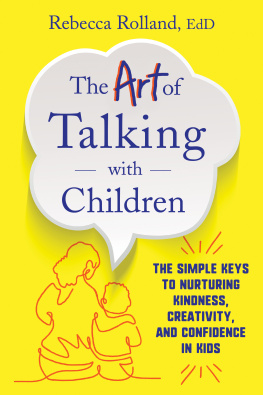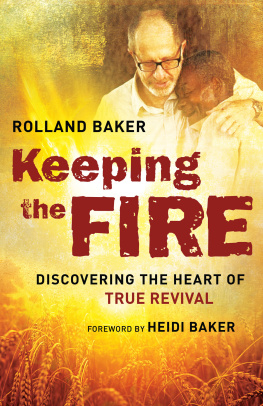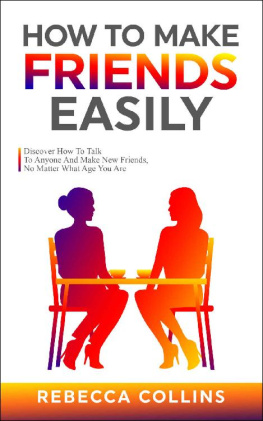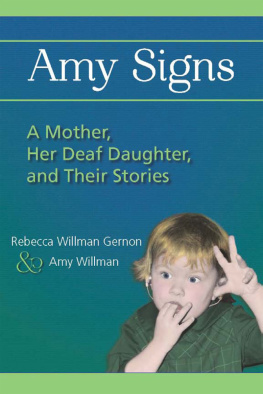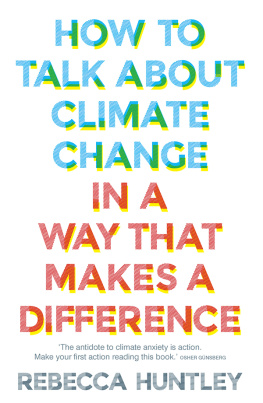Rebecca Rolland - Rich Talk
Here you can read online Rebecca Rolland - Rich Talk full text of the book (entire story) in english for free. Download pdf and epub, get meaning, cover and reviews about this ebook. year: 2021, publisher: HarperOne, genre: Home and family. Description of the work, (preface) as well as reviews are available. Best literature library LitArk.com created for fans of good reading and offers a wide selection of genres:
Romance novel
Science fiction
Adventure
Detective
Science
History
Home and family
Prose
Art
Politics
Computer
Non-fiction
Religion
Business
Children
Humor
Choose a favorite category and find really read worthwhile books. Enjoy immersion in the world of imagination, feel the emotions of the characters or learn something new for yourself, make an fascinating discovery.
- Book:Rich Talk
- Author:
- Publisher:HarperOne
- Genre:
- Year:2021
- Rating:5 / 5
- Favourites:Add to favourites
- Your mark:
- 100
- 1
- 2
- 3
- 4
- 5
Rich Talk: summary, description and annotation
We offer to read an annotation, description, summary or preface (depends on what the author of the book "Rich Talk" wrote himself). If you haven't found the necessary information about the book — write in the comments, we will try to find it.
Rich Talk — read online for free the complete book (whole text) full work
Below is the text of the book, divided by pages. System saving the place of the last page read, allows you to conveniently read the book "Rich Talk" online for free, without having to search again every time where you left off. Put a bookmark, and you can go to the page where you finished reading at any time.
Font size:
Interval:
Bookmark:
To Philippe, Sophie, and Paul
I know we did a lot, I said to my husband, Philippe, after wed finished putting our two kids to bed and cleaning up. But what did we talk about?
I dont know. Philippe spoke with his usual straightforwardness. The usual, I guess. Really, I dont remember.
We sat in our Boston apartment at the close of a busy weekend, planning the weeks schedule as we usually did on Sundays. We had to get organized before Monday. Still, despite our best intentions, we usually forgot something. There was just so much to juggle. Our weeks passed, like those of many families, in a blur of activity; our weekends, too. We had little time to prioritize or reflect... and, I realized, little time to talk with each other, or with our kids.
That lack was especially ironic, given what I did for a living and what I was passionate about. For more than a decade, my work as a speech-language pathologist, lecturer, and researcher has centered on understanding and supporting childrens language and literacy development. Ive taught at Harvard Graduate School of Education and lectured at Harvard Medical School. During those years, Ive worked with children from toddler age through graduate school. My work has brought me into contact with so many different children and families, from high-poverty preschools to Montessori schools, hospital clinics, and many places in between. Ive met kids one-on-one, in small groups, and in classrooms, to assess their language and reading levels and teach them speaking, listening, reading, and writing skills. Ive served as an academic learning specialist and taught kids with dyslexia, those on the autism spectrum, and those with major reading struggles. Ive loved understanding these childrens development, following them closely, talking with their parents, and figuring out strategies to help.
So that question I asked Philippeminor as it seemedmattered to me. Over the next days, it hung in my mind. In the rush of activity, what exactly did we talk about?
In talking to other parents, I realized our family wasnt alone. Nearly everyone was truly busy and didnt find time for much good conversation. We hardly get home in time for dinner. Then its a story and bedtime, one friend said. Another explained, We know our son wants our attention at dinner, but when hes quiet, we use the time to check email. The frantic pace of family life didnt seem to allow for much beyond surface talk. Many parents I knew raised kids while working and caring for older relatives, part of the sandwich generation. And that wasnt even considering self-care.
When I thought more carefully about our household conversations, I realized my daughter, Sophie, then five years old, and I had had many engaged, inspired conversations in the last weeks and monthsbut they hadnt been at the forefront of my mind. Several years back, Id taken her to Bostons Museum of Fine Arts. Shed run around dim-lit hallways in the ancient Egyptian rooms, peering into each sarcophagus and asking question after question. Finally, she sat on a bench and grew quiet in the peace of the dark halls.
Where did the mummies go? she asked after a long pause.
Sorry, what? I sat beside her as she swung her legs.
You said the mummies arent here anymore. That their bodies are, but they arent. So where did they go?
Hmm, good question. I considered myself spiritual, but not religious, and definitely didnt have an answer for that. So I hedged. The Egyptians thought theyd travel to another world. Thats why they worked so hard to mummify them.
Okay. She sounded impatient. But which part of them left? Their bodies are still here.
Yesbut theyre dead.
Sure. A pausethen questions tumbled out. But where did they go? And before they were born, where were they? She met my gaze. And where were you before you were born?
Wowthats a tough one. I tried to buy time. I dont remember. Do you?
Nope. Squinting, she shook her head.
And if you had to guess?
I was an old man. She sounded surprisingly certain. I got sick of being so old, so I turned into a baby again.
I can see that. I put my arm around her.
Im starving. With a jolt, she stood and twirled around. Lets have lunch.
On the way back, I couldnt help marveling at her insight and how easily shed arrived at it. Somehow, at her age, shed stumbled on the concept of reincarnation, or a version of it. And why had she brought it up, I wondered, precisely then? I thought back to her fascination with mummies, which had begun with a few Halloween picture books. Almost as soon as she could talk, shed asked about them: whether they were real, if they could bite. Todays deeper question hadnt sprung out of nowhere. Instead, it had been building, bit by bit, starting with much simpler ones.
But what about my side of the conversation? I was struck by the fact that Sophie had seemed more engaged and interested in talking, precisely because I didnt have answers. Over the past weeks and months, Id answered her dozens of questions as best as I could. This time, I admitted I didnt know. I didnt pretend to be an expert. Instead, I simply provided an opportunity and a willingness to dive in. As Id later come to realize, these opportunities to talk abound if you open your mind to them. Its not about being perfect, having expertise, or even posing the right questions. Its definitely not about knowing exactly what to say. It has far more to do with an attitude of curious waiting: using talk to open a window and letting your child take it from there.
To be fair, this talk with Sophie was unusual. The fact that I still remember it so well, three years later, is testimony to how infrequently such conversations happen if we dont make an effort to cultivate them. But these conversations dont have to be unusual. Sure, having a quiet time and place to talk had made it easier for me to focus on Sophie and answer her questions. But talking like this doesnt require a special occasion. You dont even need to leave the house. A great conversation could have happened over a book or been inspired by the back of a cereal box.
But how should we make talk more of a priority? I wondered. Add have quality conversation to our weekly schedules? No one I knew had the mental energy or time, and surely no one needed the guilt. I had to think differently about talk in our house, and I imagined that other parents might be willing to also. Because what if talk with our kids wasnt another item on the to-do list, or yet another thing to worry about, but an opportunity?
In fact, you can make a difference in the quality of your conversations, and theres a method for doing it well that science supports. The opportunities are there, available at any time, anywhere, and to anyone. This book is designed to explore why these deeper, authentic conversations often go missing, and more important, how we can have more of them, in ways that help us raise curious, compassionate kids while enjoying ourselves.
With a few tweaks and key habits, you can have far more of these great conversations. They can become not more things to remember, or more stress or work, but engaging, fun additions to your lives. You can weave them throughout your days in ways that keep things interesting and, most important, that help your kids and your whole family thrive.
Before moving on, a short note on terms: in this book, I talk about parents for simplicitys sake. But, thank goodness, kids have many others who love, raise, and care for them: grandparents, cousins, aunts, neighbors, foster parents, and host families, as well as teachers, day-care staff, camp counselors, principals, babysitters, and nannies. It truly does take a village, and that goes for talk as well. If you find yourself interacting with kids on a regular basis, this book can help. Also, when I talk about kids, Ill be alternating he and she throughout this book.
Font size:
Interval:
Bookmark:
Similar books «Rich Talk»
Look at similar books to Rich Talk. We have selected literature similar in name and meaning in the hope of providing readers with more options to find new, interesting, not yet read works.
Discussion, reviews of the book Rich Talk and just readers' own opinions. Leave your comments, write what you think about the work, its meaning or the main characters. Specify what exactly you liked and what you didn't like, and why you think so.

